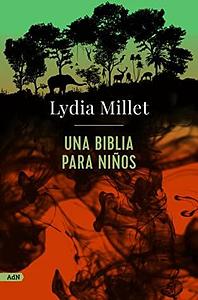Take a photo of a barcode or cover
This is, first, just a tremendously good read, a can't-put-it-down page-turner, and a fantastic feat of storytelling. Beyond that, it is a thought-provoking look at the devastated planet we've left for the next generation, and the anger, resilience, and resourcefulness of those children.
adventurous
challenging
dark
mysterious
medium-paced
Plot or Character Driven:
Plot
Strong character development:
No
Loveable characters:
Complicated
Diverse cast of characters:
No
Flaws of characters a main focus:
Yes
The book is an allegory that is filled with biblical reference while really addressing climate change.
There is a flood, angels, a crucifixion and more. The child Jack reads the bible as “God’s a code word,” he explains to his sister. “They say God but they mean nature. . . . And we believe in nature.” He’s got the whole Trinity figured out: “There’s lots the same with Jesus and science,” he says. “For science to save us we have to believe in it. And same with Jesus.” Out of the mouths of babes! But as with the prophets of old, almost nobody listens to Jack.
I should like this book because of the great reviews and it's link to climate change but I just didn't like the characters.
There is a flood, angels, a crucifixion and more. The child Jack reads the bible as “God’s a code word,” he explains to his sister. “They say God but they mean nature. . . . And we believe in nature.” He’s got the whole Trinity figured out: “There’s lots the same with Jesus and science,” he says. “For science to save us we have to believe in it. And same with Jesus.” Out of the mouths of babes! But as with the prophets of old, almost nobody listens to Jack.
I should like this book because of the great reviews and it's link to climate change but I just didn't like the characters.
I'm not sure what I think. I liked it, but didn't love it, but still kept reading it. If there's a bigger message here, I can't see it.
Had a few spectacular/vivid scenes but never really came together
This book was my attempt at reading a more modern, adult work of fiction. I normally stick with old sci-if classics or kids books. However, this book requires you to somewhat think with a child’s mindset to really take in what’s going on.
The children of washed up intellectuals on vacation harbor resentment for their parents. They are neglectful, constantly drinking and when disaster strikes never step up to the task. The kids, but especially Eve’s young brother Jack, are the ones with common sense. They defy their parents and while the older kids drink and have sex, it was “less repugnant” than their parents acts. These parents despite all being graduates with good careers are aimless. The only exception to this are some adults who are homeless “angels”, a groundskeeper named Burl, and the owner of a property who saves them from some vagabonds.
The kids actually strive throughout the book to live. They “fight” for their lives and the lives of others, unlike their cowardly parents. Returning to Jack, this child is one of the youngest but is probably the most important character in the book. It isn’t fair to say he is competent; he isn’t experienced enough for that. But his innocence brings important perspectives to the book. He is the keeper of the Children’s Bible the book is named for and he uses it to make guide his decision to try to save animals from the disaster that occurs in the book like Noah did. With this vision for a time when the storms brought on by global warming, he sets the important distinction between most adults and children in the book have: hope.
Now, would this book be something I would say is up to its acclaim? Somewhat. The allegory isn’t hamfisted at all but I think it is slipped in a way that feels a bit inorganic. Yes, hope is something that brings a nice closing to the book but it feels somewhat slapped on the ending to make it feel less bleak. The children are abandoned by their parents in the end and the few adults that can help them exit the story hurriedly. I was especially confused with the owner of the cottage and her role. There is a scene where she comes out the sky from a helicopter like a real angel and apparently repairs the youngest vagabond’s leg. It seems to be implied that this was a sort of miracle but it never is elaborated on. So it just frustrated me rather than put things into perspective. The owner also references vague “rules” being broken by the vagabonds but there is no explanation as to how she knew they were at her home.
So, after much pondering, I would say this is a good book, but you aren’t missing anything by passing it up.
The children of washed up intellectuals on vacation harbor resentment for their parents. They are neglectful, constantly drinking and when disaster strikes never step up to the task. The kids, but especially Eve’s young brother Jack, are the ones with common sense. They defy their parents and while the older kids drink and have sex, it was “less repugnant” than their parents acts. These parents despite all being graduates with good careers are aimless. The only exception to this are some adults who are homeless “angels”, a groundskeeper named Burl, and the owner of a property who saves them from some vagabonds.
The kids actually strive throughout the book to live. They “fight” for their lives and the lives of others, unlike their cowardly parents. Returning to Jack, this child is one of the youngest but is probably the most important character in the book. It isn’t fair to say he is competent; he isn’t experienced enough for that. But his innocence brings important perspectives to the book. He is the keeper of the Children’s Bible the book is named for and he uses it to make guide his decision to try to save animals from the disaster that occurs in the book like Noah did. With this vision for a time when the storms brought on by global warming, he sets the important distinction between most adults and children in the book have: hope.
Now, would this book be something I would say is up to its acclaim? Somewhat. The allegory isn’t hamfisted at all but I think it is slipped in a way that feels a bit inorganic. Yes, hope is something that brings a nice closing to the book but it feels somewhat slapped on the ending to make it feel less bleak. The children are abandoned by their parents in the end and the few adults that can help them exit the story hurriedly. I was especially confused with the owner of the cottage and her role. There is a scene where she comes out the sky from a helicopter like a real angel and apparently repairs the youngest vagabond’s leg. It seems to be implied that this was a sort of miracle but it never is elaborated on. So it just frustrated me rather than put things into perspective. The owner also references vague “rules” being broken by the vagabonds but there is no explanation as to how she knew they were at her home.
So, after much pondering, I would say this is a good book, but you aren’t missing anything by passing it up.
I liked this book for its ugliness, although I was skeptical at first. And after some uncertain reflection, I have decided that I like the messy not-quite-allegorical elements (even, perhaps especially, the "what genre is this now?" Deus ex Machina moment).
It was the very end of the book that lost me. I felt like the trinity allegory was, perhaps, an idea the author must have had once, and wanted to write a story for, but this wasn't that story. This story seems to have had its own ideas about what it wanted to be - which is fine - but to close with a return to this overly cute little thought seemed very out of keeping with the tone of the book, and perplexingly irrelevant to the rest of the story and its themes.
I think there's the ghost of a Mary Sue hiding back there. Sigh.
It was the very end of the book that lost me. I felt like the trinity allegory was, perhaps, an idea the author must have had once, and wanted to write a story for, but this wasn't that story. This story seems to have had its own ideas about what it wanted to be - which is fine - but to close with a return to this overly cute little thought seemed very out of keeping with the tone of the book, and perplexingly irrelevant to the rest of the story and its themes.
I think there's the ghost of a Mary Sue hiding back there. Sigh.
This slender novel is richly layered, exploring a wide range of interesting topics: coming of age, religion, climate change, families, alcohol and drugs, sexuality, societal breakdown, entropy, and social classes, among others. Eve, who appears to be a 14- or 15-year-old teenager, is the narrator of the novel, set on the east coast shoreline, somewhere near the Appalachian Trail. Her parents and their friends from their college days have rented a house for the summer in what seems to be their last get-together. In time, the parents and the children shift roles. The parents become hard drinking, promiscuous, drug users and the children responsible caregivers. A children's Bible, the central metaphor in the novel, is a book given to Eve's nine year old brother, a book he enjoys, though not as much as some of his other favorite books, including the George and Martha books by James Marshall. As you might expect, many of the stories in A Children's Bible come to life in the novel, some with a heavy hand but others with a lighter touch. This seems to be one of those books that readers either 'get' right away and enjoy for its many clever conceits and fine writing or dismiss as too judgmental and enviro-political. I happily count myself among the former.
The climate crisis is to this novel as war is to Lord of the Flies, and in this case the kids are alright. Tersely written and easy to imagine, full of snappy dialogue and biblical echoes, this felt to me like a contemporary classic.
Interesting concept for a novel, but I just couldn’t get into it.



